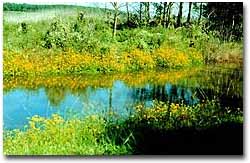
The scenic Marshyhope Creek, which winds through the quaint turn- of-the-century town of Federalsburg, forms the western boundary of the 3,800-acre Idylwild WMA in southeastern Caroline County. The area is a mix of agricultural fields, upland forests and bottomland forests, with topography ranging from flat to somewhat sloped. Some areas are wet year round.
What To See
Mature hardwoods, loblolly pine and Virginia pine forests surround many of the trails and support a rich variety of wildlife species. The surprisingly large pileated woodpecker, with its red crest, hammers on rotted logs in search of insects. Bluebirds nest in tree cavities and fly among field grasses looking for insects. Catch a glimpse of the elusive gray fox, listen for the gobble of a wild turkey, or watch beavers at work along the Marshyhope.
What To Do
Hunters will enjoy a day afield, pursuing white-tailed deer, turkey, dove, cottontail rabbits, woodcock, squirrels and waterfowl. Roads and trails will promise a day's adventure and exploration for hikers and all-terrain bicyclists. Good fishing can be found in ponds on the north end of Idylwild WMA.
Area Regulations
- Use of Idylwild WMA is generally permitted seven days a week throughout the year.
- Hunting is allowed in accordance with open seasons and shooting hours, unless otherwise noted.
- All State and Federal Hunting Laws and Regulations are applicable.
- Trapping is by permit only. Trapping bids are available in September and awarded in late October.
- Call the LeCompte WMA office for further information.
- Dove hunting is restricted to certain days and shooting hours.
- Camping is prohibited.
- No motorized vehicles are permitted, except to utilize the accessible hunting zone by those hunters in possession of an annual Access Permit.
Special Areas
- Disabled hunters wishing to use the accessible hunting zone must first obtain a
 Hunt from a Vehicle Permit, (application available online), before they can obtain an Access Permit from the LeCompte WMA Office. Both permits are free and are required to utilize the accessible hunting accommodations.
Hunt from a Vehicle Permit, (application available online), before they can obtain an Access Permit from the LeCompte WMA Office. Both permits are free and are required to utilize the accessible hunting accommodations. - Only ATV’s, UTV’s and golf carts are permitted in the accessible hunting zone.
- Some fields are managed as Special Dove Areas and as Quail Demonstration Areas and may have restricted hunting dates.
Non-hunting Users Guide
- Non-hunting visitors are welcome.
- Be aware of open hunting seasons and visit accordingly.
- Season dates available in newspapers, on the Internet, and at some area stores.
- Trail system noted on the map is suitable for hiking and birding as well as hunting.
- Trails are maintained but not actively marked.
- Expect wet footing in some areas throughout the year.
- Biting insects can be abundant in warmer months.
- The north end of the WMA contains a series of ponds that provide good fishing opportunities.
Site Management Goals
- The agricultural fields at Idylwild are managed to provide habitat and winter food for game and non-game wildlife.
- A section of Houston Branch creek is managed to provide winter habitat for waterfowl, including wood ducks, mallards and black ducks.
- Certain fields are managed dove hunting areas.
 Directions
Directions
From the Bay Bridge, take U.S. Route 50 east to Wye Mills. Take 404 to MD 313 and follow south to Federalsburg. Take MD 315 east into Federalsburg. Take Central Avenue east across Marshyhope Creek, which becomes Houston Branch Road (MD 306). Access is available via 10 parking areas surrounding the property. For additional information, contact the LeCompte Wildlife Office at (410) 376-3236.
Maps of Idylwild WMA
This area is a part of Maryland’s Department of Natural Resources public land system and is managed by the Wildlife and Heritage Service. The primary mission of the WMA system is to conserve and enhance wildlife populations and their respective habitats as well as to provide public recreational use of the State’s wildlife resources.
Eighty-five percent of the funding for Maryland's state wildlife programs comes from hunting license fees and a federal excise tax on sport hunting devices and ammunition. The federal aid funds are derived from the Federal Aid in Wildlife Restoration (or Pittman-Robertson) Fund, which sportsmen and women have been contributing to since 1937. Each state receives a share of the funds, which is administered by the U. S. Fish and Wildlife Service; these funds are used for wildlife conservation and hunter education programs, including the management of the WMA system.
Other sources of funds for land acquisition include Program Open Space Funding for Maryland's State and local parks and conservation areas, provided through The Department of Natural Resources'
Program Open Space. Established in 1969, Program Open Space symbolizes Maryland's long-term commitment to conserving natural resources while providing exceptional outdoor recreation opportunities.